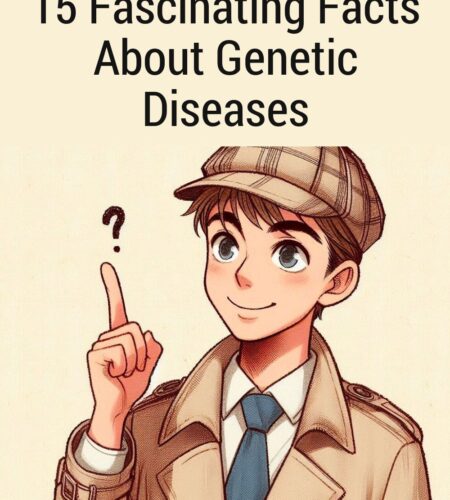Introduction:
Genetic diseases, also known as genetic disorders, are conditions caused by changes or mutations in an individual’s genes or chromosomes. These alterations can affect various aspects of an individual’s health and can be inherited or arise spontaneously during the person’s lifetime. Genetic diseases can range from mild to severe and can affect different parts of the body, resulting in a plethora of symptoms and complications. In this article, we will explore 15 fascinating facts about genetic diseases that shed light on their complexity and impact on individuals and their families.
Fact 1: Genetic diseases can be classified into different categories.
There are several different categories of genetic diseases, including single-gene disorders, chromosomal disorders, and multifactorial disorders. Single-gene disorders are caused by mutations in a single gene and include conditions like cystic fibrosis and sickle cell anemia. Chromosomal disorders result from changes in the number or structure of chromosomes, such as Down syndrome. Multifactorial disorders, on the other hand, are influenced by both genetic and environmental factors, as seen in conditions like heart disease and diabetes.
Fact 2: Many genetic diseases are rare.
While genetic diseases collectively affect a significant portion of the population, most individual genetic diseases are considered rare. This means that they occur in fewer than 200,000 individuals in the United States. Despite their rarity, addressing genetic diseases remains crucial as they can have significant impacts on individuals and their families.
Fact 3: Some genetic diseases have no cure.
Unfortunately, many genetic diseases currently have no cure. Treatment options typically aim to manage symptoms, slow disease progression, and improve quality of life. However, advancements in medical research and technology are continually being made, offering hope for potential future treatments and even cures.
Fact 4: Genetic diseases can affect people of all ages and backgrounds.
Genetic diseases can affect individuals of all ages, races, and ethnic backgrounds. They are not limited to certain demographics and can impact anyone. As such, it is crucial to raise awareness, promote genetic testing, and support affected individuals and their families.
Fact 5: Genetic diseases can be inherited.
Many genetic diseases are inherited from one or both parents. Inherited genetic disorders can be classified as autosomal dominant, autosomal recessive, or X-linked. Autosomal dominant disorders, such as Huntington’s disease, occur when a person inherits a single mutated gene from one parent. Autosomal recessive disorders, like cystic fibrosis, require both parents to pass on a mutated gene. X-linked disorders, such as Duchenne muscular dystrophy, typically affect males more often than females due to the inheritance pattern of genes on the X chromosome.
Fact 6: Genetic diseases can also arise spontaneously.
In addition to being inherited, genetic diseases can also arise spontaneously due to new mutations that occur during gamete formation or early fetal development. These mutations are not passed down from parents but occur randomly. Such spontaneous genetic alterations can result in conditions like Down syndrome and neurofibromatosis.
Fact 7: Genetic testing can help diagnose and manage genetic diseases.
Genetic tests play a significant role in diagnosing genetic diseases, determining carrier status, and aiding in disease management. By analyzing an individual’s DNA, genetic testing can provide valuable information about the presence of specific gene mutations or chromosomal abnormalities, helping healthcare providers make informed decisions regarding treatment and monitoring.
Fact 8: Prenatal genetic testing helps identify potential issues before birth.
Prenatal genetic testing offers expectant parents the opportunity to identify potential genetic disorders before their child is born. Tests like amniocentesis and chorionic villus sampling can detect chromosomal abnormalities and certain genetic conditions, providing parents with valuable information and allowing them to make informed decisions about the future.
Fact 9: Genetic diseases can manifest in various ways.
Genetic diseases can manifest in a wide range of ways, from physical symptoms to cognitive impairments. Some genetic diseases primarily affect a specific organ or system in the body, while others have broader impacts. For example, muscular dystrophy primarily affects muscle tissues, while Down syndrome affects multiple aspects of physical and cognitive development.
Fact 10: Genetic diseases can impact not only individuals but also their families.
Genetic diseases can have a profound impact on individuals and their families. Besides the physical and emotional challenges faced by the affected individuals, families may also need to navigate additional medical care, financial burdens, and support systems. Understanding and addressing the needs of both individuals and their families are essential in managing genetic diseases effectively.
Fact 11: The field of genetics is continuously evolving.
The field of genetics is constantly evolving, with ongoing research and technological advancements enhancing our understanding of genetic diseases. Scientists and medical professionals are continually discovering new genes, developing innovative treatments, and uncovering novel insights into the complexities of genetic disorders.
Fact 12: Genetic counseling provides support and guidance.
Genetic counseling offers individuals and families affected by genetic diseases a valuable resource for support and guidance. Genetic counselors are specially trained professionals who help individuals understand the genetic factors contributing to their condition, explain inheritance patterns, discuss available options for testing, and provide emotional support.
Fact 13: With early intervention, the impact of genetic diseases can be reduced.
Early detection and intervention play a vital role in minimizing the impact of genetic diseases. Timely medical interventions, therapies, specialized diets, and assistive devices can help manage symptoms, improve quality of life, and promote overall well-being for individuals living with genetic disorders.
Fact 14: Research into genetic diseases benefits broader medical knowledge.
Research aimed at understanding genetic diseases not only benefits individuals directly affected by these conditions but also contributes to broader medical knowledge. Discoveries made while researching genetic diseases often have implications for other areas of medicine, leading to advancements in treatments, diagnostic techniques, and overall medical practices.
Fact 15: Genetic diseases can drive innovation.
The challenges posed by genetic diseases have driven innovation in various fields, including genetics, medicine, and technology. Advancements in genetic engineering, genomic medicine, and personalized therapies have been made possible through research focused on genetic diseases. By tackling these complex disorders, scientists and innovators are paving the way for advancements that can benefit both individuals with genetic diseases and the wider population.
Conclusion
Genetic diseases are complex conditions that have diverse impacts on individuals and their families. From the classification of genetic diseases to the importance of genetic testing and counseling, these 15 fascinating facts provide insights into the intricacies of genetic disorders. By raising awareness, fostering research, and promoting support systems, we can strive to enhance the lives of those affected by genetic diseases and work towards a future with improved treatments and potential cures.
Subscribe to our email newsletter to get the latest posts delivered right to your email.




Comments